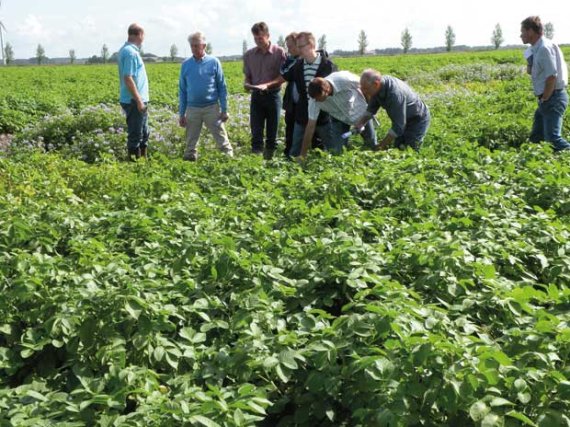Activists who destroyed two experimental plots of GM potatoes at Wageningen UR in Drenthe and Groningen also damaged developments in organic potatoes. That is the opinion of potato researchers at Wageningen UR.
The case is black and white for many outsiders: you choose either GMOs or organic agriculture. However, organic and GM crop improvement specialists are working closely together in the Plant Sciences Group’s DuRPh (sustainable resistance to Phytophthora) and Bio-Impuls research programmes. ‘Phytophthora is such a pernicious cause of blight in potatoes that we are having to pull out all the stops,’ says Edith Lammerts van Bueren, professor of Organic Crop Improvement. She does not use genetic modifications, but does utilize knowledge about genes for resistance that has been acquired using GMO techniques.## Resistance
The researchers from both programmes are developing potatoes that are resistant to the aggressive and rapidly mutating potato disease agent Phytophthora. Organic agriculture also needs this. Conventional agriculture is still able to use crop protection agents against outbreaks of this fungal pest, but organic agriculture does not have that option. However, conventional plant breeding techniques have still not yet been able to cross-breed sufficient resistance to Phytophthora in quickly.Genetic modification helps find genes for resistance to Phytophthora more quickly and breed them into the potato, according to another researcher, Bert Lotz. Because the mould mutates rapidly, the potato needs to contain two or three such resistance genes. The organic programme can use that knowledge in its cross-breeding programmes.## Destruction
The experimental plots contain several types of potatoes next to each other, including organic and GM potatoes, in order to investigate the feasibility of various combinations of resistance genes. The destruction of the field trial means that the Plant Sciences Group will have less comparative material about how various Phytophthora strains adapt to the resistance genes. That knowledge is important both for organic agriculture and for the cisgenic potato that Wageningen UR is developing. Several resistance genes from other potato strains have been built into this potato using GM techniques, and as a result hardly any pesticides are needed to protect the crop.

